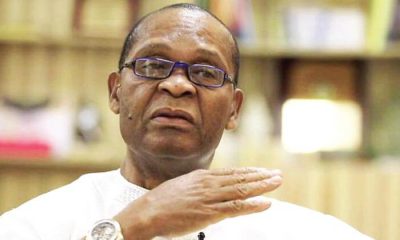Nigeria News
The Damning Impacts Of Fuel Subsidy Removal On Nigeria’s Health Sector

It is no longer news that the federal government has stopped the payment of fuel subsidies in Nigeria.
Recall that President Bola Ahmed Tinubu, when he assumed power on May 29, 2023, announced the removal of fuel subsidy, a decision that saw the per litre price of Premium Motor Spirit (PMS), better known as petrol or fuel, increase across the country.
One untold hardship many Nigerians are suffering following the announcement is the skyrocketing of commodities.
The Health Sector Affected
Naija News reports that the removal of fuel subsidies has had a damning effect on the Nigerian health sector.
Like other sectors in the country, the health sector relies heavily on fuel generators as an alternative to electricity power supply for operations to ensure the smooth functioning of medical facilities and the transportation of essential medical supplies.
However, the escalation in transportation costs has significantly impacted healthcare services as it becomes more expensive for patients to access medical facilities, especially those in rural areas.
The rise in transportation costs may discourage patients from seeking timely medical attention, leading to delayed diagnoses in critical situations and potentially worsening their health conditions.
While some health centres, private or public, may be able to meet up with some demands through alternatives, the patients would have to bear the brunt of the increase in the cost of the services rendered.
This added financial strain may force healthcare providers to cut back on essential services or compromise the quality of patient care. The lack of adequate power supply can also disrupt the storage of temperature-sensitive medications and vaccines, compromising their efficacy.
The financial burden on patients, however, can lead to reduced affordability of healthcare services, further widening the gap in access to quality healthcare.
While Nigerians groan over the new norm, it is crucial for policymakers and stakeholders to carefully consider the potential negative impact on the health sector and look for better ways to assist the citizens.
Patients Resort To Cheap Drugs, Quack Doctors
Speaking with Naija News, an Enhanced Adherence Counselling (EAC) Nurse at the General Hospital in Igbeti, in the Olorunsogo Local Government Area of Oyo State, Saliu Zainab, expressed displeasure over the state of the nation under the present administration, especially on the increase in the price of commodities.
According to her, the removal of subsidies on petrol by the Nigerian government has resulted in low productivity in the community and the country at large.
She said many people cannot afford the cost of transportation to the hospital to receive daily treatments like daily injections and wound dressings, among others.
“As expected, the price of hospital commodities like drugs, laboratory reagents, and instruments have been rising since the advent of fuel subsidy.
“People now patronize quacks and so-called traditional medicine since their services are cheaper and easily accessible compared to services rendered to them in a standard hospital, and this could lead to an increase in maternal mortality rate, which could later cause devastation,” Zainab said.
She further stated that the fuel subsidy removal may likely make it impossible for the health insurance industry to thrive.
“Many enrollees may drop out of the various health insurance schemes unless the government urgently provides appropriate palliative.
“In addition, even if the people visited the hospitals, the majority of them are not able to pay for the cost of drugs and other related medical services or pharmaceutical services due to financial constraints.
“In one of the hospitals in Oyo state, some of the patients, when reaching the pharmacy, go for drugs with lesser price and leave the one that might work for the disease’s condition that brought them to the hospital.”
In a separate interview, a Medical Doctor and general practitioner at the St Francis Catholic Hospital, Igbeti, Oyo State, Dr Ishola Kayode Emmanuel, gave some insights into the effect of the fuel subsidy removal on the health sector in the community.
He said: “The effect is basically on everybody, and of course, it has a lot of dimension to it in terms of the prices of commodities that we use. Things have skyrocketed so much.
“Since fuel subsidy was removed, virtually every week when you go to the market, you find an increase in the prices of goods.”
Blood Bag Now Sells Between N12,000 to N20,000
Giving some instances of the damning effect of the increase in the price of things in the country, Dr Ishola, said: “A recent example is the blood bag. Initially, I think we used to buy it at ₦5,500, but I think the last time we changed it was around N12,000. There was a time during the hit of that subsidy when we had to buy it up to N16,000.
“Now you can imagine the effect of that on the amount we are going to be charging for a bag of blood, and of course, we are not including the price of the test to be conducted or drugs. So the bag is going for N12,000 now; at a point, you can’t get blood for less than N20,000.
He added: “Then another thing is that we discovered that most people are not even presenting the situation as often as they hope. So especially for people with chronic diseases like diabetes and hypertension, you will give an appointment of maybe two weeks, one week, and you are expected to be back, but of course, the cost of the consultation. I guess is probably accounted for why they are not presenting it.
“That will always bring them back when the situation has probably become chronic or something serious. So we tend to have more serious cases in recent times plus cases that are ordinary, so the clinical cases we know present are the things they can manage at home instead of coming due to the cost.
“When they consider transportation, when they consider the cost, they are going to decide themselves when they will come to the hospital.”
By managing themselves, do you mean the people resorting to buying cheap drugs, traditional medicines or something?
“Yes, they can take care of themselves outside the hospital. And that has created more problems for them because recently, we saw a woman who had, I think, body pain or something and instead of presenting at the hospital, she went to a chemist.
“We went through some of the medicines they gave her, and we discovered she was given five different types of the same drug, which is Diclofenac.
“That Diclofenac is supposed to be taken, like a maximum of 100 milligrams daily, you understand, but this woman took about 500 milligrams at once. She came here with serious pain serious, and, of course, the long-term side effect of those drugs are yet to be discovered, but we can see that instead of patients coming to the hospital to get adequate treatment, they tend to patronize quacks.
“So you don’t often see patients who are stable, you understand, as I said earlier, they believe they can manage it,” said Dr Ishola as he expressed concerns about the aftermath of the long-term effect of people with chronic diseases like diabetes.
I understand this is a private hospital. However, are there some services you cannot render now due to the unavailability of electricity power and the rising cost of petrol?
Dr Ishola responded by saying, “Maybe in some other facilities but in our facility, we have a solar generator which we can often use, and of course, even in facilities where they use generators, the bill will still go out to the patients. So it will still tell on the patients because of the cost.”
Sharing his personal experience following the increase in the price of petrol, the medical practitioner said: “I go to work like every week, and I mean every day, you understand. Every month, I spend around N40,000 to fuel my vehicle to work. But now I’m spending about N110,000. That is like three times the former cost. Now how much is my salary and of course, salaries remain the same.
“I’m spending close to three times what I used to spend. That tells a lot about my own economy as well it has a lot of effect on my economy, and of course, everything is skyrocketing.
“I go to the market, and things are so expensive. So your take-home at the end of the day is not what it is.”
What would your advice to the government be on the latest development? Even though state governors have just been allocated N5 billion to distribute to the citizens as palliative.
Dr Ishola said: “I think it is a good thing that the government has considered giving out palliative. That shows they understand that the people are suffering. But I think they could have done it in a better way than this palliative instead of giving it out to state governments. Because I personally don’t know what they want to do for the people, but I think if we have to advise the state government, I don’t think there is any sense in sharing that kind of money.
“It’s better to use that kind of money probably to improve the transportation system because I wonder how much food material that kind of money will buy and how many people will get this. Because one thing that people are facing indeed, I think, is the issue of transportation. Yeah, primarily, the fuel increase actually affects transportation more.
“It is now transportation that formed the basis of the height of the increase in food prices and most of the things around us, you understand. So if they can actually tackle this may, be by creating mass transit more like public transit system, I am sure that will bring succour. They can provide more buses to middle cities so that you can easily move around. That way, it will help a lot yes than sharing the money. Because if you go to the farmers now and ask them why yeah, I mean, why they’re increasing the cost of cassava, they will tell you the transportation cost is too much.
“Now, if they have a means of bringing their goods to the market without killing so many expenses, I think it will help to reduce the price of food, and of course, if the price of food can go down and most things, at least there will still be some succour,” Dr Ishola concluded.
Meanwhile, some patients interrogated at different hospitals in the community of Oyo State gave similar instances. They lamented the recent hike in the price of petrol, which birthed an increase in the cost of commodities.
The citizens appealed to both federal and state governments to reconsider making the price of petrol stable and consider the appropriate palliative to bring assistance to the present crisis.












